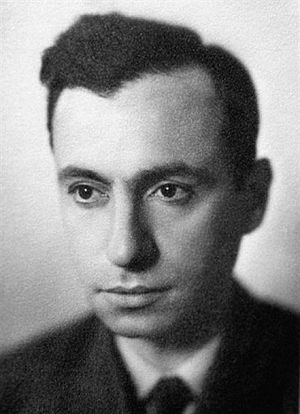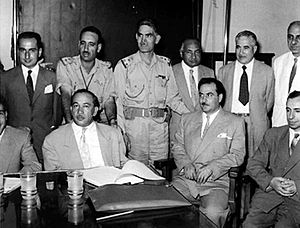Michel Aflaq facts for kids
Quick facts for kids
Michel Aflaq
ميشيل عفلق |
|
|---|---|
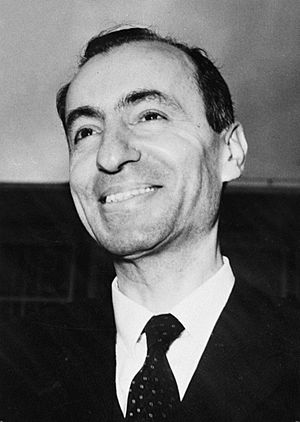
Michel Aflaq in 1963
|
|
| Secretary General of the National Command of the Iraq-based Ba'ath Party | |
| In office 8 February 1968 – 23 June 1989 |
|
| Deputy | Shibli al-Aysami |
| Preceded by | Position established |
| Succeeded by | Saddam Hussein |
| Secretary General of the National Command of the Arab Socialist Ba'ath Party | |
| In office June 1954 – April 1965 |
|
| Preceded by | Position established |
| Succeeded by | Munif al-Razzaz |
| Member of the National Command of the Arab Socialist Ba'ath Party | |
| In office 6 April 1947 – 23 February 1966 |
|
| Personal details | |
| Born | 9 January 1910 Damascus, Syria Vilayet, Ottoman Syria |
| Died | 23 June 1989 (aged 79) Paris, France |
| Resting place | Baghdad |
| Citizenship | Syria, Iraq |
| Political party | Arab Ba'ath Movement (1940–1947) Arab Socialist Ba'ath Party (1947–1966) Iraq-based Ba'ath Party (1968–1989) |
Michel Aflaq (Arabic: ميشيل عفلق, romanized: Mīšīl ʿAflaq, Arabic pronunciation: [miːʃeːl ʕaflaq], 9 January 1910 – 23 June 1989) was an important Syrian thinker and Arab nationalist. He helped create the ideas behind Ba'athism, a political movement. Many people who follow Ba'athism see him as its main founder. He wrote several books, including The Battle for One Destiny (1958).
Aflaq was born in Damascus, Syria, to a middle-class family. He studied philosophy in Paris, France, where he met Salah al-Din al-Bitar, who would become his political partner. After returning to Syria in 1932, Aflaq first became involved in communist politics. However, he left the communist movement because he felt it supported colonial rule.
In 1940, Aflaq and al-Bitar started the Arab Ihya Movement. This group later changed its name to the Arab Ba'ath Movement. In 1947, it joined with another group to form the Arab Ba'ath Party. Aflaq was chosen as the party's leader.
In 1952, the Arab Ba'ath Party merged with another group to create the Arab Socialist Ba'ath Party. Aflaq became its leader in 1954. The party worked with Gamal Abdel Nasser, the President of Egypt, which led to the creation of the United Arab Republic (UAR). Nasser asked Aflaq to close down the party, which he did. After the UAR ended, Aflaq was again chosen as the Ba'ath Party's leader. However, his power weakened, and he resigned in 1965.
Aflaq was forced out during a military takeover in Syria. This caused the Ba'ath Party to split into two groups. He fled to Lebanon and then to Iraq. In 1968, Aflaq was elected leader of the Iraqi-led Ba'ath Party. He held this position until he died in 1989.
Aflaq's ideas, known as Ba'athism, focused on uniting the Arab world into one strong Arab Nation. He believed this unity was needed for progress. He did not fully support capitalism or communism. Ba'athism emphasized freedom and a special kind of Arab socialism. Aflaq believed in keeping government and religion separate, but he was against atheism. Even though he was Christian, he saw Islam as a sign of "Arab genius." After the 1966 split, the Syrian-led Ba'ath Party accused Aflaq of stealing ideas and even sentenced him to death in his absence. The Iraqi-led Ba'ath Party disagreed with these claims.
Contents
Early Life and Education
Michel Aflaq was born on January 9, 1910, in Damascus. His family was Orthodox Christian, and his father was a grain merchant. Aflaq went to Western-style schools in Syria.
In 1929, he went to Paris to study philosophy at the Sorbonne. There, he was inspired by the ideas of Henri Bergson. He also met Salah al-Din al-Bitar, who would become his close friend and partner in politics. Aflaq started an Arab Student Union in Paris and learned about the writings of Karl Marx.
He returned to Syria in 1932 and became active in communist politics. However, he left the movement because he felt the French Communist Party supported colonial rule. Aflaq then saw the communist movement as a tool of the Soviet Union.
Starting a Political Career
Creating the Ba'ath Movement: 1940–1947
After returning to Syria, Aflaq and al-Bitar became teachers at a top secondary school. By 1940, they had started a student group that met regularly. That year, they officially formed a political party called the Arab Ihya Movement. They spent much of their time in 1941 promoting their party.
In 1942, Aflaq became known as a powerful speaker. The party changed its name to the Arab Ba'ath Movement. The word "Ba'ath" (Arabic: بعث) means resurrection or rebirth. This new name showed their goal for a rebirth of the Arab world. Another leader, Zaki al-Arsuzi, accused Aflaq and al-Bitar of stealing his party's name. They became rivals, even though both supported Arab nationalism.
In October 1942, Aflaq and al-Bitar quit their teaching jobs to focus on politics. In 1945, they asked the French authorities to make their movement an official party. The Arab Ba'ath Movement became an official party in 1947 when it merged with al-Arsuzi's group to form the Arab Ba'ath Party.
Founding the Ba'ath Party
The first meeting of the Arab Ba'ath Party was held in Damascus in 1947. Aflaq became the party's main leader, known as Amid. This role gave him wide powers over the party's ideas. Al-Bitar was chosen as the Secretary General. Al-Arsuzi was not given any position. Aflaq focused on the party's ideas, while al-Bitar managed its daily work.
In the late 1940s, Aflaq and al-Bitar taught about Ba'athist ideas. In 1948, they started a newspaper called al-Ba'ath, meaning rebirth. Aflaq tested the party's strength during the 1948 Arab–Israeli War. He led protests against the Syrian government, blaming them for army defeats. He called for the president to resign. Aflaq was arrested but later released.
In August 1949, Aflaq became the Minister of Education, his only government job. He held this post for a few months. Syria then faced more military takeovers. In 1951, Adib Shishakli took power and banned all political parties, including the Ba'ath Party. Aflaq and other leaders fled to Lebanon.
In Lebanon, Aflaq and al-Bitar agreed to merge the Arab Ba'ath Party with another group, the Arab Socialist Party. This created the Arab Socialist Ba'ath Party in 1952. This new party worked against Shishakli's rule. Shishakli was overthrown in February 1954.
Rise and Fall of Power
Political Influence: 1954–1963
After Shishakli was overthrown, Syria held democratic elections. The Ba'ath Party, led by Aflaq, al-Bitar, and al-Hawrani, won many seats in parliament. Aflaq was elected Secretary General of the party's National Command, which meant he was the party leader.
When the United Arab Republic (UAR) was formed, President Nasser asked Aflaq to dissolve the Ba'ath Party. Aflaq did so without asking other party members. The UAR was not good for the Ba'ath Party, as it lost much of its influence. Many younger members blamed Aflaq for this.
After the UAR broke up in 1961, Aflaq called a meeting in 1962. He was re-elected as the party's secretary general. During this time, Aflaq and a secret military group started talking. This group wanted to overthrow the government. Aflaq supported their plan.
In February 1963, the Ba'ath Party in Iraq successfully took power. This inspired the Syrian military group to act quickly. The 8th of March Revolution, a military takeover in Syria in 1963, was also successful. A Ba'athist government was then set up in Syria.
Challenges and Splits: 1963–1965
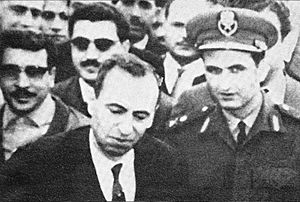
The relationship between the Ba'athists and Nasser's supporters was difficult. Nasser saw the Ba'ath Party's rise in Iraq and Syria as a threat to his own leadership. He began to criticize Aflaq. Aflaq became strongly against Nasser.
This conflict weakened Aflaq's position within the Ba'ath Party. The military group gained more power. They believed Aflaq was too old and weak to lead. At a party meeting in October 1963, Aflaq barely kept his position as Secretary General. Military officers began to take over leadership roles.
The Ba'ath movement also faced problems in Iraq. A coup in November 1963 removed the Ba'ath Party from power there. Aflaq and other Ba'athists fled Iraq and went to Syria.
A military officer named Muhammad Umran warned Aflaq about the military group's secret plans to remove him from power. Aflaq tried to dissolve the military-controlled Regional Command, but most party members opposed him. A power struggle began between Aflaq and the military group. The military group joined forces with a civilian group that was against Aflaq.
In March 1965, the Syrian branch of the party decided to give more power to the Regional Command. This meant the Regional Secretary became the head of state in Syria. Aflaq was worried. In May, he called a meeting to challenge the military group. However, he lost his position as Secretary General. Munif al-Razzaz took his place.
Downfall and Exile: 1966–1968
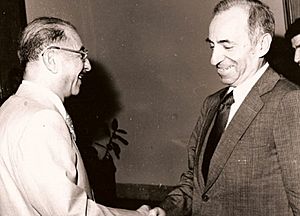
Al-Razzaz, Aflaq's successor, was from Aflaq's group. He tried to restore the National Command's power. He appointed al-Bitar as Prime Minister. However, on February 23, 1966, a military coup led by Salah Jadid and Hafez al-Assad overthrew the Syrian government and the Ba'ath Party leadership.
Aflaq was exiled from Syria and told never to return. He was captured and held for a short time. In August, he managed to escape with the help of friends and fled to Lebanon, and later to Brazil.
Aflaq's removal caused a major split in the Ba'ath Party. Two separate Ba'ath Parties were formed: one led by Iraq and one led by Syria. The Syrian-led party claimed Zaki al-Arsuzi was the true founder of Ba'athist ideas. The Iraqi-led party, however, still saw Aflaq as the founder. In February 1968, the Iraqi-led party held a meeting in Beirut and elected Aflaq as Secretary General of their National Command.
Iraqi-led Ba'ath Party: 1968–1989
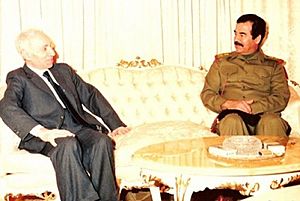
Aflaq moved to Baghdad, Iraq, in 1968. He stayed there until 1970. During a conflict known as Black September, Aflaq felt the Ba'ath leadership was not doing enough to help the Palestinians. He wanted Iraq to get involved, but the Iraqi leader refused. Because of this, Aflaq returned to Lebanon. In 1971, the Syrian government sentenced Aflaq to death in his absence.
Later Life and Death
Aflaq returned to Iraq in 1974. He did not take an active role in Iraqi politics. He published more books during this time, including The Struggle Against Distorting the Movement of Arab Revolution in 1975. He became friends with Saddam Hussein, who became President of Iraq in 1979.
During the Iran–Iraq War, Iran accused Hussein of being controlled by a Christian, calling Aflaq a "Christian infidel." Even though Aflaq was honored as the founder of the Ba'ath movement in Iraq, his advice on policy was often ignored.
Michel Aflaq died on June 23, 1989, in Paris, France, after heart surgery.
Claimed Conversion to Islam
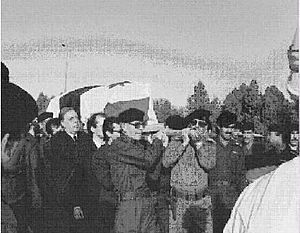
Saddam Hussein claimed that Aflaq converted to Islam before he died. Aflaq's family members have disagreed with this claim, though his son, Iyad, said his father thought about converting in 1980. Regardless of the debate, Aflaq was given an Islamic funeral. Some of Aflaq's family believed Hussein made up the conversion story to distance Ba'athism from Christianity.
A large tomb was built for Aflaq in Baghdad. After the 2003 American invasion of Iraq, the tomb was used by American soldiers. Aflaq's family reported that the tomb was damaged during the invasion.
His Ideas
|
Michel Aflaq
|
|
|---|---|
| Era | Modern philosophy |
| Region | Middle Eastern philosophy |
| School | Ba'athism, Arab nationalism |
|
Main interests
|
Politics, philosophy, sociology, nationalism, philology history |
|
Notable ideas
|
Principal founder of Ba'athism (with al-Bitar and Zaki al-Arsuzi), The Battle for One Destiny, The Struggle Against Distorting the Movement of Arab Revolution |
|
Influenced
|
|
"Unity, Liberty, Socialism"
The main idea of Ba'athism is summed up in the slogan "Unity, liberty, socialism."
- Unity meant bringing all Arab people together into one Arab Nation. Aflaq believed that without unity, Arab nations would decline. He thought a revolutionary movement was needed to "cure" these nations.
- Liberty was important, but not in the same way as in Western democracies. Aflaq believed in different ways of thinking, but not in many different political parties. He thought the Ba'ath Party should guide the people during a transition period.
- Socialism for Aflaq was a special kind of Arab socialism. He believed it started with Muhammad and aimed to free Arab people from oppression. It was not about strict state control or economic equality, but about creating independent individuals.
Aflaq disagreed with Karl Marx's idea that only material things matter. However, he did think that understanding economic conditions was a great discovery. He was critical of both capitalism and communism.
The Role of Islam
Aflaq saw Islam as a revolutionary movement. He believed that the Arab awakening was linked to a religious message. Because of this, he thought Arab identity was connected to Islam. He felt that all Arab communities should respect Islam's spiritual side, even if they were not religious Muslims.
Aflaq, a Christian, admired Islam. He believed that Arab nationalism was like a second revolution for the Arab world. He said that Arabs should try to be like Muhammad, who was both a religious and political leader.
Aflaq stressed that Islam should not be forced on the government or society. He said the Ba'ath Party was against atheism but also against extreme religious views. He believed all religions were equal. Aflaq strongly supported a government that was separate from religion. He thought a Ba'athist state would be based on Arab nationalism and freedom.
Legacy and Impact
Aflaq's ideas have been viewed in different ways. Some critics say his writings lacked clear plans for what went wrong or what needed to be done. They felt he focused too much on words and not enough on practical solutions.
Unlike other thinkers, Aflaq did not clearly separate what is real from what should be. He saw both as things that could be achieved. His friend and colleague, Salah al-Din al-Bitar, was more practical in politics, while Aflaq was seen as a "dreamer."
Aflaq was described as a quiet and simple person. He was accused of seeking help from others instead of leading alone. He worked with leaders like Gamal Abdel Nasser and later Saddam Hussein. Some members of the Syrian-led Ba'ath Party believe Aflaq took his ideas from Zaki al-Arsuzi, calling him a "thief."
In his writings, Aflaq supported free speech and human rights. He was against the military dictatorship that took over Syria, as he had planned for a democracy. However, the governments that used his ideas, like those of Hafez al-Assad in Syria and Saddam Hussein in Iraq, often used them to support dictatorships instead of true freedom.
Selected Works
- في سبيل البعث (English: On the Way of Resurrection, published 1947)
- Itihad Souriyya wa Misr (English: Unity Between Syria and Egypt, published 1958)
- Ma'rakat al-Masir al-Wahid (English: The Battle for One Destiny, published 1958)
- Nuqtat al-Bidayya (English: The Starting Point, published 1971)
- Al-Ba'ath wa al-Wihda (English: The Ba'ath and Arab Unity, published 1972)
- Al-Ba'ath wa al-Ishtirakiyya (English: The Ba'ath and Socialism, published 1973)
- Al-Nidal did Tashweeh Harakat al-Thawra al-Arabiyya (English: The Struggle Against Distorting the Movement of Arab Revolution, published 1975)
See Also
 In Spanish: Michel Aflaq para niños
In Spanish: Michel Aflaq para niños
 | Kyle Baker |
 | Joseph Yoakum |
 | Laura Wheeler Waring |
 | Henry Ossawa Tanner |


